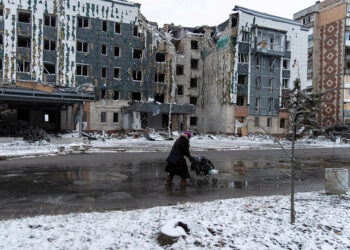Read Part 1.
Read Part 2.
To win the geopolitical favor of “third countries,” some global players have established a new approach to rewarding them with preferential economic gestures or by other similar means. It should be noted that “third countries” are no less successful or flexible in taking advantage of this. Thus, to the newly exalted “realism” is now added a geopolitical handwriting, dictated by an undisguised material interest. Practically, the international system has moved from latent transactionalism to an open phase of mutual exchange. This trend seems to have become irreversible and may become a kind of norm in the medium term, if it is not already. It also poses the following question to be discussed next in this article.
A return to a political economy?
In this sense, the attempt to establish the so-called Global South as a quasi-autonomous pole in the emerging system (lack of system) of global relations is indicative. We have already discussed this issue in previous articles, but now we will highlight one characteristic feature of this quasi-autonomy – a concrete and understandable economic benefit as a measure of expediency of foreign policy actions.
Reflecting this new trend is the fact that although 141 of the 193 countries in the UN format have condemned Russian aggression in Ukraine, only 33 of them have joined the sanctions against Moscow. To illustrate this even better: roughly the same number of countries supply Ukraine with lethal weapons, while the rest of the world, home to two-thirds of the world’s population, refrains from military assistance in one form or another. Stating these numbers is not an attempt to measure the reality with an arithmetic parameter. By no means. These numbers are merely a call to face reality from the perspective of us as a small country.
In the existing situation, even those countries whose responsibilities in the global order are much higher than those of small countries and even of regional leaders do not avoid advantageous moves. They do not consider it unworthy of themselves even when the domestic political system itself or the foreign alliance should not give them any kind of moral right to do so. A good illustration of this is modern India, which has openly justified its geopolitical line with mercantile economic benefits (India’s “Balancing Act”) which has manifested itself in an at least threefold increase in the purchase of significantly discounted Russian oil.
All of the above shows that current processes cannot be limited to a “struggle between democracy and autocracy,” as it leads only to the narrowness of such explanatory analysis, shortsighted foresight, and consequent errors in policymaking. It is a fact that the modern stage offers us a policy of so-called “non-waste interests,” and this reality should be accepted sensibly and calmly. The Georgian approach needs the appropriate capacity to adapt to achieve the task at hand – greater national security, greater economic prosperity.
The refusal to contrast black and white in politics…
The ideological contrasts that have characterized Western politics for many decades have, if not disappeared, then undergone a serious reassessment. Judging by the signs that have shown up today, one can assume that the approach of moving from “extreme to extreme” has been stress-tested, facilitated by several unsuccessful military campaigns and the claws of the post-Covid economy. And balancing the right choice between an active role in the external arena and domestic needs became the inevitable dilemma.
The search for the right golden mean is hotly debated in Western sources; there are many opinions or recommendations; there are criticisms, sometimes accompanied by radical appeals. But the task of maintaining domestic economic and social stability and development so that it does not lack the necessary resources for its weighty positioning in the system of external relations remains the axis of the problem. In light of the problems accumulated at this stage, this equation (or balance) is not easy to solve. As an example, we again cite the US national security strategy, which, inter alia, does not exclude situational or tactical cooperation with other countries, or even President Macron’s statement on the advisability of a “balanced partnership” of France in Africa.
In short, the declared revision of the political line leads to the necessary understanding by the West that (1) other countries may have their own interests and (2) they may not always coincide with the interests of the West. We have already mentioned this rule of exceptions on the example of several individual countries, which does not mean that these countries are revisionists or that they have begun to sabotage the West: due to their geographical and geopolitical or historical and cultural specificity, they simply retain their own, necessary handwriting in creating practical policies.
Thus, for sincere communication and real work without hypocrisy in inter-state relations (including partner relations), it is necessary at least: (1) to understand clearly what our interests and the interests of the other side are, (2) to be able to identify common priorities in light of the intersection of these interests, and (3) to be able to say frankly what can be achieved together and what cannot.
Public optimism and behind-the-scenes pessimism?
The resumption of Russian aggression in Ukraine on February 24 last year is a test of the strength of the connection between the publicly demonstrated huge practical efforts to defeat the aggressor, on the one hand, and the subjects of these efforts, on the other. Today, this strength is assessed in different ways, and it is not only about the position of countries that have not joined Western sanctions or are in a “balancing” mode.
Here, indeed, the most important task is for the indestructible unity to rise before the flouting of international law in the Russian neighborhood and, with a unified standard, unwavering will and result-oriented actions, facilitate the full (rather than half) payment of one big “debt” – the removal of countries caught in a geopolitical and security vacuum, from that vacuum.
And as for the aggressor, its main intention is to find and methodically deepen the cracks in the unity directed at it; for it is testing the strength of generations accustomed to comfort after the Cold War, who consider peace and stability in Europe an eternal given; by devaluing human life, it is trying to embarrass the European “burgher,” nurtured by “consumerism,” and to disarm his will; Having failed to achieve quick success on the battlefield, it switches to another tactic – the protracted, gradual escalation of military conflict, and in this way, again by devaluing human life, tries to make the necessary changes in the rival’s psychological mindset. At the same time, under the autocracy of its own internal political system, the small influence of public opinion (if it exists at all) does not create any obstacles for the aggressor to pursue an expansionist policy. Time, according to its own calculation, is working for it and it will try to prolong the conflict as long as possible precisely for the purpose of a gradual and final disintegration of the said unity.
Solving the above problem is not easy, of course. First of all, one must believe that one can and will do it, and that solving the problem in half, or postponing it, or stretching it out over a long period of time will make the task much more difficult. Accordingly, the realization of publicly proclaimed goals requires a political attitude grown on realism. Certain fluctuations in the mobilization of necessary attitudes occur periodically. Several such examples can be found in the lines of the Euro-Atlantic Union, where attitudes toward threats are sometimes explained by differences in their perception and evaluation. This, in turn, is determined by geographical remoteness from the source of the threat, as well as historical ties with it and the intensity of trade and economic contacts (influenced by political economy?). Moreover, even in the mentioned context, recently we have been hearing about such “special cases” that require a separate special consideration. For example, in the ranks of Republicans in the United States there are such attitudes towards the war in Ukraine (whether at the level of the House of Representatives or in the context of the presidential election of 2024) that often does not coincide with the course proclaimed by the occupants of the White House – Democrats. Just recall the statement of one of the possible candidates of the Republican Party, Ron DeSantis, who reduced the Russian-Ukrainian war to the category of a “territorial dispute”.
The near future will show whether the system can adapt in time, finally get rid of hypocrisy and properly readjust to the management of existing threats. After all, this, in addition to the future of international security, is related to the national security of our country, its adequate setting up and appropriate adaptation to current processes.
‘Notes for Georgia’
The resumption of Russian aggression in Ukraine definitively put an end not only to the post-1945 system of global security, but also to its variety, the post-Cold War structure. The international order has turned into a “disorderly order” at worst, and a hybrid order at best. One symptom of this hybridity is the attempt to create security blocs along regional lines (so-called “regional networking”). Probably a peculiar echo of the same trend is the increasing number of countries pursuing a policy of “balancing” – avoiding a clear stand on one side with regard to military conflict at the expense of greater coordination at the regional level. The same trend explains the willingness of a major global actor such as the United States to work not only with traditional allies, but also with amorphous “middle powers” to achieve short- and medium-term goals.
In the current situation, Official Tbilisi’s agenda for this stage should consider: (1) The final rejection of the stereotype of seeing the world through an idealistic prism, (2) Searching for unconventional ways of solving Georgia’s “more security” issue in the emerging global “alternative order” together with the civilized world, (3) Identifying experimental models in coordination with allies and partners and considering practical aspects on an accelerated basis.
At the same time – to put an end to idealism – the Georgian side should bear in mind that any hegemon will always be true to its nature; that a “big country” cannot be “ordinary” a priori, since this is the opposite of its global hegemonic influence and essence. Therefore, the right combination of healthy interests, coexistence with the dominant powers without hypocrisy and useless posturing, being in acceptable “influences” is one of the prerequisites of our development.
Speaking of hegemony, let us note one caveat to better understand the essence of hegemony: while “hegemony” refers to the reputational influence caused by soft power on its part and the understandable attraction to it, “imperialism” refers to the imposition of one’s own influence on others by force. This is a fundamental difference that the Georgian side should keep in mind, which it should take into account, sensibly and rationally.
Regarding the region, we believe that Georgia’s foreign policy should leave all possible and result-oriented doors open. In the South Caucasus, the main focus should be on achieving “stability through trade”. We believe that such flexibility and pragmatism will make it easier for our country’s allies and partners to better penetrate, engage and consolidate in the region: a region where the concept of “spheres of influence” is still relevant and will remain so for the foreseeable future.
In short, the time has come for Georgian ultra-realistic, unsentimental policy. Under such a policy, an action free of ideological clichés should be measured only by economically understandable benefits and by relations acceptable in terms of security.
Analysis by Victor Kipiani, Geocase Chairman














